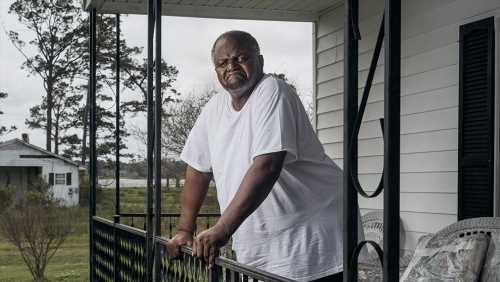
Raoul Peck’s “Silver Dollar Road” follows the Reels, a Black family in North Carolina battling decades of harassment by land developers trying to seize their waterfront property. In the film, the family matriarch Mamie Reels Ellison and her niece Kim Renee Duhon tell the harrowing story. Both women are doing their best to defend their ancestors’ land and their brothers and uncles, respectively. Melvin Davis and Licurtis Reels were wrongfully imprisoned for eight years — the longest sentence for civil contempt in North Carolina history. The 100-minute documentary, in part, relies on the in-depth reporting of Lizzie Presser, whose article on the topic was published by ProPublica and The New Yorker in 2019.
In 2016 Peck premiered his acclaimed James Baldwin documentary “I Am Not Your Negro” at TIFF, which went on to earn an Academy Award nomination. “Silver Dollar Road,” which was commissioned by Amazon, will debut at TIFF on Sept. 8.
How did this doc come about?
I was approached by ProPublica, Amazon and Viola Davis’ production company, JuVee Prods. to, at first, executive produce the project. When I read the Presser article I knew it was an incredible story that needed to be told. It was extraordinary material. Because I saw what the film could be I decided to also direct it.
You use your own footage as well as footage shot by ProPublica back in 2019. Did you know from the start that you were going to incorporate ProPublica’s footage into the doc?
There was an incredible amount of existing material, and I had two choices. It’s either I say, okay, I start the film from scratch, or I use the existing material and see what I could do with it. For me there were real moments of life and real moments of drama so I couldn’t just pass it by and say, well, it doesn’t exist. That footage was an integral part of the project. My job was to figure out how to make a dramatic story using that archive and what I could bring to complete the story.
I appreciated how you chose to end the doc. Everything isn’t tied up in a bow, which it easily could have been. What made you want to end the doc in the way that you did?
If I make a documentary, I want it to be different. We are now embedded in a way to look at stories, to look at people as if it’s just another consumer good and I don’t make stories like that. This is a story about people who I know, people that could be my own family. So, the story is not a crime story. The story is not a story about victims. It’s a story about us. At the end of the film I didn’t want (the family’s) drama to define who they are. On the contrary, I wanted to show that the fight continues. Dominant American cinema gives you a product that you watch and then you can throw it away. You don’t need to live with it because the problem is solved. It says the system is okay. There was a problem. The problem is solved. That’s it. You don’t need to do anything else. You can go home safe. All my life I have tried to counter that narrative because it’s not the reality.
How do you feel about working with conglomerates like Amazon?
I’m not a young filmmaker. I’ve done my homework and my advantage is that I choose the film I make. I’ve never made a film in my entire career because of money. I was never obliged to make any project. So the projects I make are under the conditions I want. If I cannot come to an understanding with a platform or with investors, I just don’t make the film, that’s it. That’s my choice. I made one of my most progressive and provocative films with HBO — “Exterminate All the Brutes” (2021). I would never have made it if there was any attempt at censorship or any attempt to tell me what to do or how to make it. It was a great collaboration. Ultimately, the goal is to make a film accessible to a wider public. What is the alternative? To go back in a cave and make a film with limited money for a few people? That’s not where the fight is. You have to go where there’s a wider audience and fight as much as you can without bending to money or authority.
Read More About:
Source: Read Full Article